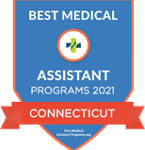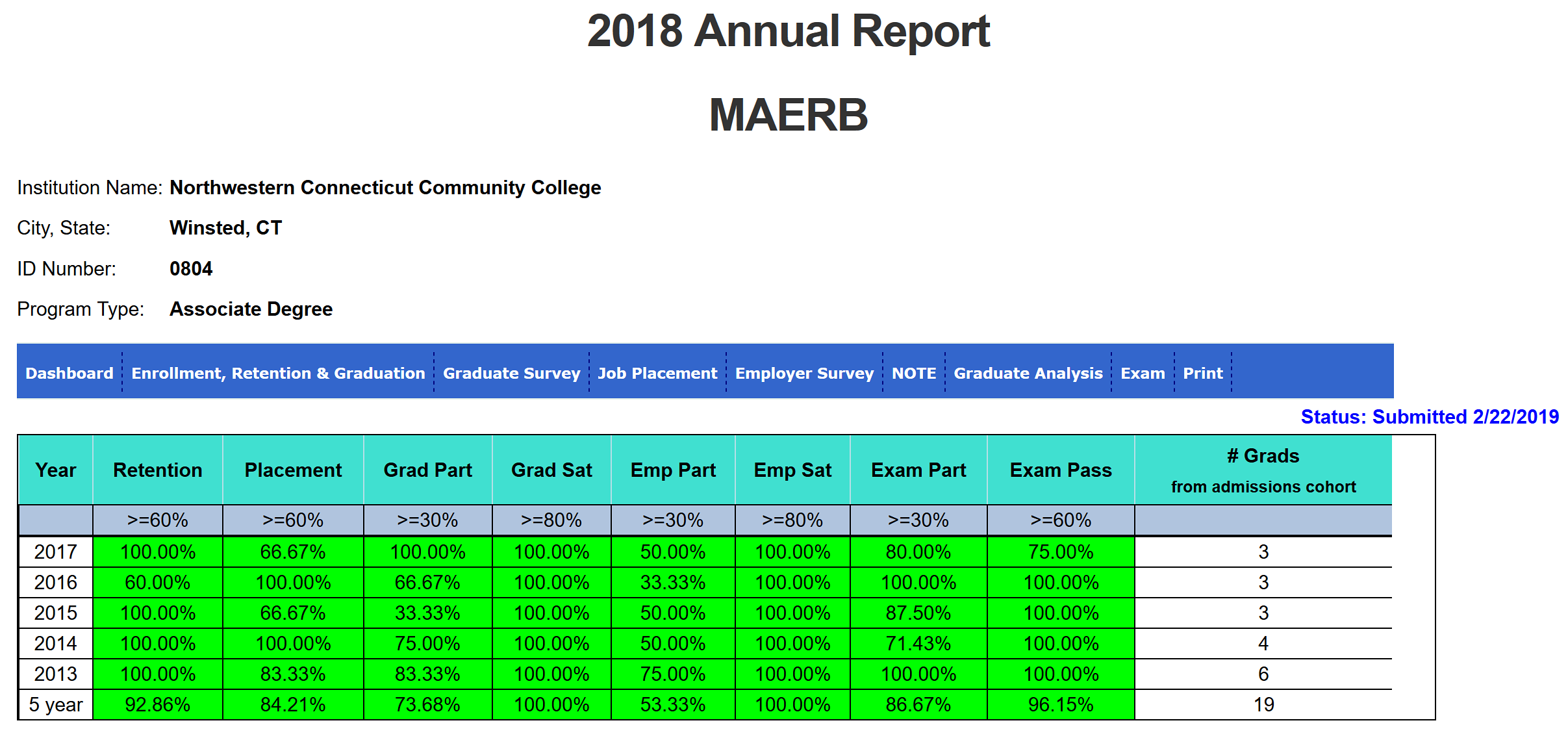Becoming Connecticut State Community College
STUDENTS: The Community Colleges are undergoing a merger with a plan to become Connecticut State Community College in fall 2023; please work closely with your advisor/program coordinator to select your courses accordingly. Click here for more details about this merger.
 Mission
Mission
Graduates of the Medical Assisting program at Northwestern Connecticut Community College are satisfied with the education that they receive, as there is an average 100% graduate satisfaction rate over the past five years.
Faculty
Melissa Bettigole, mbettigole@nwcc.edu, 860.738.6393
Outcomes
In addition to General Education Outcomes, learners who complete the Medical Assisting degree will be able to:
- Apply for the national medical assisting certification examination.
- Perform all medical assisting skills at entry-level competency.
- Demonstrate and utilize the principles of medical asepsis and standard precautions, as well as other safety precautions.
- Recognize emergency situations and respond appropriately to emergency care techniques in various life-threatening situations.
- Obtain and effectively chart all pertinent patient data.
- Apply knowledge and skills of various clinical procedures such as vitals, laboratory testing, and other diagnostic and medical procedures.
- Utilize and interpret medical terminology.
- Demonstrate basic pharmacology, dosage calculations, and routes for administration of medications.
- Provide education to patients, families, and other caregivers on various healthcare including preventative and treatment regimes
- Demonstrate a working knowledge of the human body including structure, function, and basic pathologies.
- Demonstrate an understanding of the appropriate and effective application of legal and ethical standards of practice.
- Accurately maintain healthcare records, upholding all laws, regulations, and applications of legal concepts to the healthcare practice and the medical assisting scope of practice.
- Apply current medical insurance guidelines in billing and the use of ICD-10 and CPT coding.
- Communicate effectively with patients and other healthcare providers.
- Competently function within an interdisciplinary healthcare team.
Coursework
SEMESTER 1
ENG* 101 Composition – 3 credits
MED* 111 Administrative Medical Assisting – 3 credits
MED* 112 Medical Insurance & Billing – 3 credits
MED* 125 Medical Terminology – 3 credits
CSA* 105 Introduction to Software Applications – 3 credits
SEMESTER 2
ENG* 102 Literature & Composition OR COM* Communication Elective – 3 credits
MED* 133 Clinical Medical Assisting – 4 credits
MED* 242 Clinical Laboratory Procedures and Practices II – 4 credits
MAT* 137 Intermediate Algebra – 3 credits
SEMESTER 3
PHL* 112 Medical Ethics – 3 credits
BIO* 110+L Principles of Human Body w/Lab OR BIO* 127 Cell Biology with Organ Systems – 4 credits
MED* 245 Clinical Laboratory Procedures – 4 credits
MED* 250 Principles of Pharmacology – 3 credits
MED* 250L Principles of Pharmacology Lab – 1 credit
SEMESTER 4
MED* 281 Medical Assisting Externship1 – 4 credits
PSY* 111 General Psychology I – 3 credits
ELECTIVE Humanities or Fine Arts Elective – 3 credits
ELECTIVE Social Science Elective – 3 credits
ELECTIVE Directed Elective (HIM* 203 suggested) – 3 credits
TOTAL CREDITS 60
Federal Regulation, 34 CFR 668.43-Institutional Information for Disclosure for Licensure Program requires the institution to disclose whether completion of a covered licensure program would be sufficient to meet licensure requirements in a State for that occupation.
Disclosure is not applicable to this program. Professional licensure, certification, and/or education are not state requirements to work in Medical Assisting.
However, the Centers for Medicare & Medicaid Services (CMS) rule states that only “credentialed medical assistants” (as well as licensed health care professionals) are permitted to enter medication, laboratory, and radiology orders into the Electronic Health Record (EHR) and have such entry count toward meeting the meaningful use requirements of the Medicare and Medicaid EHR Incentive Programs.
Our program(s) lead to eligibility for nationally-recognized professional certification(s) that are preferred by employers but not required by the state for employment in the field.
As part of the annual review, graduates of the Medical Assisting Associate Degree Program over the past 5 years at Northwestern Connecticut Community College reported an average 100% graduate satisfaction rate.
The program’s most recently approved Annual Report Form (ARF) indicates:
Retention Percentage: 93%
National Certification Exam Pass Rate: 96%

